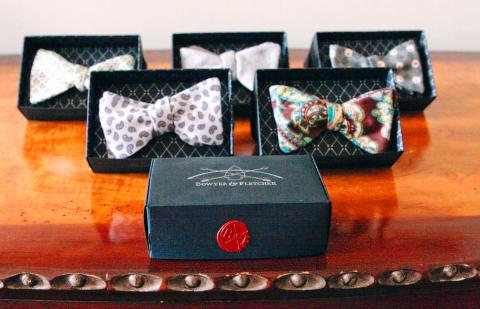In November, 2011, Jahmal Landers found himself wandering aimlessly through Taipei’s Dihua Street (迪化街) market area. Having indulged in one cup too many of oolong tea, his bid to locate a bathroom led him unwittingly into a building that would change his life.
The rundown concrete structure, built in 1908 during the Japanese colonial era and today called Yongle Market (永樂市場), is unimpressive from the outside. But what lies within on the building’s second floor is truly exceptional.
“I was overwhelmed. It was bustling, not unlike an ordinary Taipei street, but it was a world unto itself, where creative energy had the place buzzing,” Landers said.

Photo courtesy of Jahmal Landers
WARDROBE RENOVATION
A self-confessed addict of popular television shows Mad Men and Boardwalk Empire, Landers, 31, said it was such cult period dramas that drove his desire to renovate his wardrobe in a bid to emulate the undeniable elegance of characters such as Enoch “Nucky” Thompson and Don Draper.
Landers added that three highly fashionable British guys he once lived with in Taiwan taught him about designers like Ozwald Boetang. One friend, who worked for a British luxury clothing brand, even promised to teach him how to tie a bow tie. He never did, but it piqued Lander’s interest.

Photo courtesy of Jahmal Landers
“Once I learned how to tie one, I was looking for self-tie bow ties in Taipei, but I couldn’t find many, so I decided to take a sewing class because I wanted to make some myself,” he said.
NAVIGATING YONGLE MARKET
Landers, born and raised in Portland, Oregon, said it took half-a-dozen trips to the Yongle fabric market, where he scoured the collections of each vendor, before he began to get his bearings.
“At first I would get disoriented and forget where I saw certain patterns that I really wanted, but by the 10th visit I had built up relationships with some of the vendors and knew exactly where to go,” he said.
His first purchase from the fabric market was a tartan-patterned Italian silk wool blend.
“As soon as I arrived home, I was able to appreciate the quality of the fabric and how much of a commodity it was, so I turned around and immediately headed back to the market to buy more. It was nearly NT$3,000 per yard,” he said.
Each trip provided Landers with a uniquely different experience and the discovery of new materials.
“I would buy as much as I could carry and make a mental note of what I wanted to grab on my next adventure. Whatever I left behind for the next trip would haunt me,” he said.
addicted to bow TIES
Working at the time as an English teacher, Landers spent every hour outside of the classroom indulging in his new addiction. At first, the thickset martial arts enthusiast — weighing 104kg, standing 1.83m tall and the proud owner of “two sets of sausage fingers” — would use a simple needle and thread in his painstakingly slow mission to achieve his goal.
However, eventually his eagerness to achieve more in a shorter space of time led him to purchase a Juki sewing machine, much to the disbelief of his housemates.
“Sometimes I would forget to eat or sleep. My girlfriend felt like I was cheating on her with bow ties. It was a love affair of sorts. It was invigorating to sit in my little closet with my fabric and Juki sewing machine, just sewing until my heart was content. I felt alive,” he said.
“It was my zen time,” he added.
LUCRATIVE OBSESSION
Landers began receiving requests for custom-made bow ties after posting photographs of his handiwork on social media.
“I started working on the brand once I realized that it was a viable business opportunity, and it helped that I enjoyed doing it,” he said.
Landers reached out to some friends in Portland, who run a Web site development company, and asked them to build a Web site for him. They agreed, but instead of quoting him a price for their services, they offered to build it for a stake in his business, changing the operation from a one-man mission in a Taipei apartment, to a four-man company with five contracted sewers.
In September, 2012, Landers and his business partners founded their company, Bowyer & Fletcher, and in December the same year, almost two years to the day after his first visit to the Yongle fabric market, he moved back to Portland where production is now based.
“In the early days we experimented with production in Taiwan, but our scale was too small when we started for it to make sense or meet minimums. So we quickly changed our production model and set up contracts with sewers in my hometown,” he said.
RAPID SUCCESS
Bowyer & Fletcher has grown rapidly, now producing neck ties and pocket squares alongside their classic handcrafted bow ties. The company has sold products in Taiwan, Hong Kong, Australia, China, England, Italy, Germany, Brazil, Canada, Columbia and all over the US via its online store.
Landers counts as customers Desiree Hartsock and Chris Siegfried of popular US television show The Bachelorette, and former NBA player Antonio Harvey.
“We provide [Harvey] with a different bow tie for all 82 games of the NBA season,” Landers said.
When questioned on what the future holds for Bowyer & Flecther, Landers said the company must continue to increase its scale of production and build synergy by working with other creative individuals and businesses.
“Right now we are working on a line of Seven Fold Neckties with Wildwood Bespoke. We will continue to increase our national retail presence and make quality accessories. We are also working on expanding our line to include a few other products,” he said.
Landers, true to his humble nature, was keen to pay tribute to the influence and support he has received from friends and professionals along every step of the way on his extraordinary journey.
“I met so many positive people that were so instrumental to my success. I felt like they were all conspiring to help my dream come true,” he said.
His message to others aspiring to achieve their dreams is: “Basically, surround yourself with positive and creative people. Take obstacles for granted and keep your eye out for solutions.”
Asked about Taiwan, Landers said that he plans to return in the near future.
“Even if it is just to see a few lifelong friends and check out Yongle. I love Taiwan, the scenery, the food and the beautiful people, so it will always hold a special place in my heart.”
For all his reluctance to take full credit for his achievements, it is obvious that Landers has put every part of himself into realizing his dream, although he believes he still has a long way to go. However, no matter what the future holds, there is one memory he will always cherish.
“Yongle Market was huge. My dream is to go back and re-establish some of the relationships that I started there. I have traveled to several countries, but I have never been to a place like Yongle. If it were not for Yongle, Bowyer & Fletcher could very well still just be a pipe dream of mine,” Landers said.

The canonical shot of an East Asian city is a night skyline studded with towering apartment and office buildings, bright with neon and plastic signage, a landscape of energy and modernity. Another classic image is the same city seen from above, in which identical apartment towers march across the city, spilling out over nearby geography, like stylized soldiers colonizing new territory in a board game. Densely populated dynamic conurbations of money, technological innovation and convenience, it is hard to see the cities of East Asia as what they truly are: necropolises. Why is this? The East Asian development model, with

June 16 to June 22 The following flyer appeared on the streets of Hsinchu on June 12, 1895: “Taipei has already fallen to the Japanese barbarians, who have brought great misery to our land and people. We heard that the Japanese occupiers will tax our gardens, our houses, our bodies, and even our chickens, dogs, cows and pigs. They wear their hair wild, carve their teeth, tattoo their foreheads, wear strange clothes and speak a strange language. How can we be ruled by such people?” Posted by civilian militia leader Wu Tang-hsing (吳湯興), it was a call to arms to retake

This is a deeply unsettling period in Taiwan. Uncertainties are everywhere while everyone waits for a small army of other shoes to drop on nearly every front. During challenging times, interesting political changes can happen, yet all three major political parties are beset with scandals, strife and self-inflicted wounds. As the ruling party, the Democratic Progressive Party (DPP) is held accountable for not only the challenges to the party, but also the nation. Taiwan is geopolitically and economically under threat. Domestically, the administration is under siege by the opposition-controlled legislature and growing discontent with what opponents characterize as arrogant, autocratic

Desperate dads meet in car parks to exchange packets; exhausted parents slip it into their kids’ drinks; families wait months for prescriptions buy it “off label.” But is it worth the risk? “The first time I gave him a gummy, I thought, ‘Oh my God, have I killed him?’ He just passed out in front of the TV. That never happens.” Jen remembers giving her son, David, six, melatonin to help him sleep. She got them from a friend, a pediatrician who gave them to her own child. “It was sort of hilarious. She had half a tub of gummies,